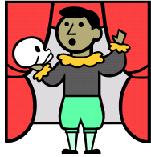That is the question
To judge trials on fictional characters or not to judge them?
 One of the innumerable perques of being a Supreme Court justice: You get called to participate in these little pieces of legal theater, in which historical events are re-tried, or fictional characters are called to court to answer for their behavior.
One of the innumerable perques of being a Supreme Court justice: You get called to participate in these little pieces of legal theater, in which historical events are re-tried, or fictional characters are called to court to answer for their behavior.
Goofy? Yes. Fun? Probably. Loved by Seventh Circuit Judge Richard Posner? Absolutely not. (But more on that in a bit).
In any event, WSJ Supreme Court correspondent Jess Bravin on Monday writes about these little novelty trials and hearings on page one of the paper.
For instance, writes Bravin, Justice Anthony Kennedy came to Los Angeles in January to conduct a mental-competency hearing for Shakespeare's brooding Dane, Hamlet, who, in front of Kennedy, stood accused of killing his friend's father, Polonius.
Billed as "Justice Anthony M. Kennedy's the Trial of Hamlet," the production featured real-life celebrity lawyers including the deputy district attorney who's prosecuting Lindsay Lohan for shoplifting and, as a bleeding-heart juror, Oscar-winning actress Helen Hunt.
Unlike many people, some of America's top jurists enjoy spending their off-hours pretending to do their day jobs. Several justices say the faux trials, which often raise money for causes like the Supreme Court Historical Society and Washington's Shakespeare Theatre Company, provide a convenient excuse for pleasure reading.
"When you're reading all these briefs," says Justice Ginsburg, pointing at a stack of legal filings in her chambers, "it's nice to take time off and read something great or delightful."
Bravin got a luminary, and one who played Hamlet to good effect, to opine on whether the character could or should have been held criminally culpable for slaying Polonius. Said actor Mel Gibson, whose own criminal attorney, Blair Berk, represented Hamlet in the January production in LA: Hamlet is "not only justified, but it's his duty to protect his mother from someone he knows does not belong there . . . He was doing his job, as far as I was concerned."
Now, back to Judge Posner for a minute. Posner is not a fan of these theatrical productions, it seems. Writes Bravin, in this WashWire post:
[Judge Posner] says mock trials of fictitious characters don't "contribute to anyone's enlightenment." For Judge Posner, the hobby symptomizes the broader ills of contemporary "celebrity culture."
"That's the problem with presidents and Supreme Court justices and billionaires. They think that because they are successful in one sphere they're experts in everything," Judge Posner says. Supreme Court justices should stop "preening" and return to "their dignified anonymity," he says.
Fair enough. But that didn't stop the erudite juror from giving his own take on the Hamlet/Polonius question:
The notion he [Hamlet] did it [killed Polonius] because he's insane that doesn't make sense. That's a misunderstanding of the play . . . . Hamlet isn't insane. Hamlet feigns insanity—that's a standard feature of a revenge play. The Hamlet play is very, very old, and has German origins centuries earlier . . .
(Published by WSJ - March 14, 2011)